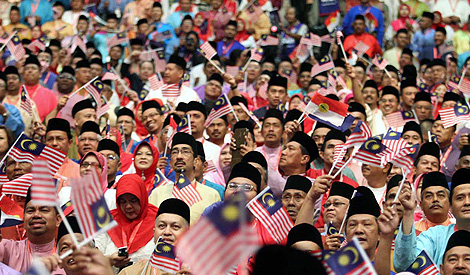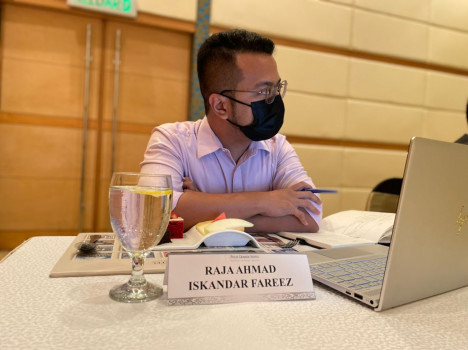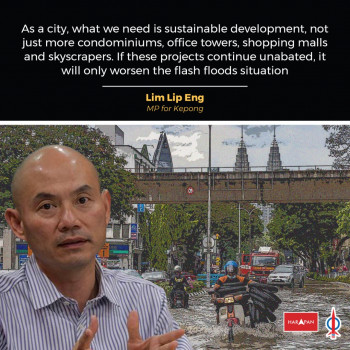
Are Malays really beggars in their own land? The answer would not come unless there is mature conversation about it (Pic from MalaysiaKini)
By Pauline Wong
There is, truth be told, no ‘correct’ way to approach something as sensitive as the topic of race, and when it comes to the Bumiputera agenda; argue one side of the fence, and you would find vociferous critics on the other side, waiting eagerly to lob stones across and shatter your defenses.
However, it is for precisely this reason that both arguments must be presented, and if a conclusion be drawn, it would then be a balanced one.
Balance, it seems, is what is sorely lacking in times where topics such as bumiputera agenda and the New Economic Policy (NEP) crop up.
Malays beggars in their own land?
In typical fashion, former Prime Minister Tun Dr Mahathir Mohamad recently declared that disunity within the Malays themselves have led to the community being “beggars” to the Chinese.
In the report on The Malaysian Insider, Tun M as he is known said the Malays who made up 60% of the population should be politically dominant, but that power has weakened because of the division between the Malay-led parties.
“Now Umno, PKR, and PAS have to beg for support from DAP to win the general election. When we become beggars, we no longer have power,” he was reported as saying in his keynote address at a youth leadership programme in Kuala Lumpur on Dec 20.
“This is our fate now. We plan to achieve developed-nation status by 2020. Our nation might get there. But, because of disunity, what we planned in vision 2020 for (the Malays) may not materialise,” he added.
Tun M, who is patron to right-wing Malay rights group Perkasa, is not a lone voice in the wilderness, shouting about how Malays have been marginalised.
Perkasa and their ilk have often claimed that if the government does not help the Malays, there will be fresh riots at hand and have even demanded that Bibles be burned over the controversial Allah issue.
Even Islamist group Ikatan Muslimin Malaysia (Isma) has claimed that Chinese and the non-Malays have always bullied the Malays.
On the surface, these remarks are racist, inflammatory, and seditious.
However, consider this: Malays, by and large, make up the largest percentage of those earning below what is considered a ‘livable wage’ of RM3,000.
According to the National Household Income Survey 2012, of 38% of the total population earning below RM3,000, Malays make up 45% of that number.
Of those earning between RM1000 – RM1999, more than 20% are Malays. Only 7.4% of the total number of high-income earners (RM10,000 and above) are Malays, compared to nearly 15% of Chinese and 10% of Indians.
Malays also make up the largest percentage of unemployed graduates and the largest number of bankrupts; reports show that most unemployed graduates are Malays from poor families who have a poor command of English.
One could argue that this is because Malays make up more than 60% of the population, and it makes ‘sense’ that Malays would be the ‘majority’ in all things, good and bad; but that would be outright denial of the facts before the case.
So hate them if you will, but racist and provocative though they may be, their cause is valid enough — Malays have fallen behind for a long time and will continue to do so with or without the right-wingers’ chest-thumping ways.
The flipside of the Bumiputera agenda
However, equally as remiss would be to ignore the idea that this very argument (of Malays falling behind) is the stumbling block to resolving the problem in the first place.
Forgive the clumsy metaphor, but if you give a child with two perfectly healthy legs a pair of crutches and tell him that he needs them to walk no matter what, chances are, he will grow up to believe he is incapacitated and cannot live without the crutches.
As such, economists and politicians have urged for the NEP to change according to the times, as the Malay middle-class grows.
One economist is adjunct professor of Economics and Development Studies at Universiti Malaya, Tan Sri Kamal Salih, who in a report on The Malaysian Insider said the NEP should be scrapped.
He said that the Bumiputera agenda has been the backbone of the Barisan Nasional (BN)-led government’s economic plans since 1969, its pro-Malay policies justified for decades by the economic backwardness of the Malays as a result of the British colonial policy of divide and rule.
But he says the time has come for Putrajaya to go for a national agenda which is more inclusive.
“Putrajaya must go for the national agenda and create a national policy that is more inclusive. And if it does that properly, and avoid the pitfalls of the past, then I think it can achieve its economic goals, without having this red flag of being a ‘Bumiputera agenda’.
“If you are trying to reduce inequality and reduce the gap between the rich and the poor, the beneficiaries will be largely Bumiputeras anyway,” he had told the newsportal.
He also noted that inequality was more prominent within ethnic groups, rather than between them, and poverty could no longer be defined along racial lines.
“Ethnicity is no longer the basis for inequality. It has now become (defined) by income and the disparity between the rich and the poor, the gap between the CEO and the ordinary worker. So the whole thinking must change.”
This is further supported by a report by two economic analysts Dr Muhammed Abdul Khalid and Dr Lee Hwok Aun, which Kamal co-authored.
The Human Development Report 2013 found that that since 1970, inequality between ethnic groups has decreased and contributes only about 4% to Malaysia’s overall inequality in 2009.
Public Accounts Committee chairman and three-term Umno Pulai MP Nur Jazlan Mohamed in his column on the same newsportal also warned that as more Malays rise to be middle-class, the goals and objectives of the NEP must change to match this growth.
“The fact is, more Malays realise that what was laid out in the NEP, born from the tragedy of the May 13 riots, must also change with the times,” he wrote.
“If the Malays cannot debate and discuss intellectually about the bumiputera agenda, and instead continue to shout that the government has failed to develop the bumiputera, or the Malays specifically, as a community, how will the bumiputera agenda achieve its goals in the future?”
So are the Malays really beggars in their own land?
The answer is both “yes” and “no”, but we would never be able to decide which is which, unless we can argue that that the NEP both helped and damaged the Malays as a whole.
Can we admit that —and this was alluded to in Dr Mohammed’s book ‘The Colour of Inequality’ — the NEP even helped spawn a whole cohort of Chinese businessmen who use the Malays as their ‘front’ just to get bumiputera privileges?
There needs to be a conversation, a deep one, where we ask ourselves if we are mature enough as a society to admit that the very thing meant to help the Malays has become a monster that has left the Malays poorer than ever? -The Rocket





